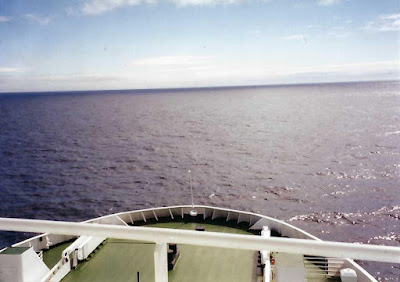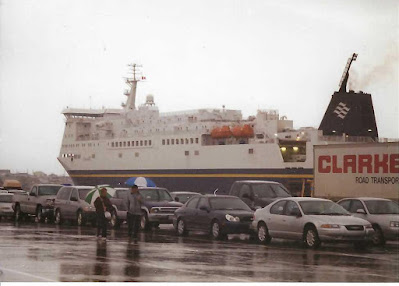This past winter, my son James and his wife Lindsey went on vacation in Miss Patty’s native Germany. While there, they made a brief side trip to France and visited Paris from January 4 to 8, Wednesday to Sunday. Following in the footsteps of James’ four grandparents and two of his great-grandparents, they absorbed as much of this great city as they could in the limited time that they had. Afterwards, they spoke enthusiastically about Paris and recommended it to me as a vacation destination. Their visit reminded me of an opportunity I once had to visit Paris, an opportunity which I fortunately passed up.
The training ship State of Maine arrived in Nantes, on the west coast of France, at 9:30am on Friday, June 9, 1978. She remained there for four days, departing at 8:00pm on Monday, June 12. During this time, I was busy with several shipboard duties, but I also had some leisure to go ashore and see the sights. So it was not all work and no play.
Nantes was a medium-size provincial city with a modest port facility on the Loire River about 25 miles upstream from the sea. A group of us explored the city on Saturday afternoon and found it quite interesting. On Sunday morning, we attended Mass at the fifteenth-century Cathedrale Saint-Pierre and afterwards lounged in the eighteenth-century Jardin des Plantes. In the afternoon, we rode a train to nearby La Baule, a quiet beach resort on the Bay of Biscay. Monday morning found us all back at work aboard ship, but with an unpleasant surprise from a few of our shipmates.
A weekend bus trip to Paris had been offered as an alternative to remaining in Nantes. The thinking behind it was that prospective Merchant Marine officers should receive a cultural education in addition to technical shipboard training. This sounded like a fine idea. My parents endorsed it, and they offered to give me the money to pay for it. They urged me to take this wonderful opportunity to visit Paris because of its stature as one of the great cultural and educational capitals of the world. I wanted to go, but I didn’t feel right about them spending this extra money on me. More significantly, I had a vague notion that something about this weekend in Paris just didn’t seem right.
On Monday morning we cadets were ordered to assemble on the sun deck to hear from the commandant, the man in charge of discipline. He was rip-roaring, red-in-the-face angry, and he erupted in a vicious shouting rampage.
Shouting long and loud, the commandant informed us that our shipmates in Paris had not pursued cultural activities but had instead engaged in a drunken riot of vandalism. The hotel, reportedly one of the finest in Paris, suffered shattered windows, broken furniture, damaged walls, and shredded draperies. Vomit and urine saturated beds, couches, carpets, and bathrooms. Liquor bottles were strewn everywhere. Other guests complained bitterly. The management was outraged. The police came and quelled the riot.
While the commandant was absolutely right in condemning this orgy of destruction, we thought he was absolutely wrong in spewing his venom at everyone. The vast majority of us had not gone to Paris and had not carried on like a wild horde of ugly Americans. We knew better than that. In directing his unbridled wrath at all of us, the commandant seemed to be blaming the innocent majority as well as the guilty minority. In doing this so theatrically, he succeeded mostly in making a fool of himself. It was bad enough that a crowd of intoxicated adolescents had gone berserk while guests in the French capital; to have a supposedly responsible adult also go berserk added insult to injury.
Furthermore, this grand display of bluster and bombast carried no real bite. The culprits did not get in serious trouble. On the contrary, the bill for repairs sent by the hotel was distributed evenly to all the cadets’ accounts. The innocent were thus required to pay as much as the guilty for crimes which they had not committed. Howls of protest arose afterwards from angry parents, but in an egregious display of administrative arrogance, the school refused to take corrective action. We had a choice of either paying up, or not paying and forfeiting graduation and licensing as Merchant Marine officers. All would be lost then.
When my parents learned of these events, they were disgusted. As educated and cultured people, they naturally wanted me to become such, too. When my mother had attended college in the late 1930s, she was selected to spend a semester at the Sorbonne in Paris, but the political instability of the time prevented this. The threat of war had cancelled her program; the premonition of drunken depredation cancelled mine. Happily, however, additional opportunities for higher education and cultural development came to both of us.
Frequently, such higher education and cultural development come in the sacred scriptures,
not in rioting and drunkenness,
not in chambering and wantonness,
not in strife and envying (Rom. 13:130,
as the Apostle Paul wrote to the Romans. Instead,
A wise man will hear, and increase learning;
and a man of understanding shall attain
unto wise counsels….but fools despise
wisdom and instruction (Prov. 1:5,
7).
The State of Maine sailed as scheduled on Monday evening. The pilot brought her down the peaceful and placid Loire, and then she proceeded into the calm and quiet Atlantic. For most of us on board, the ship’s time in Nantes had been a pleasant occasion. Nantes had shown itself to be a charming city of considerable historic and commercial significance surrounded by beautiful rolling farmland.
As for wintertime Paris, James and Lindsey had a wonderful but too-short visit. Remembering their childhood stories about Madeline, Ludwig Bemelmans’ fictional heroine of the Parisian boarding school, they visited the sights of her adventures and found them just as edifying as the churches, museums, and monuments!
Now, let’s look at some photographs from off the beaten tourist path:











